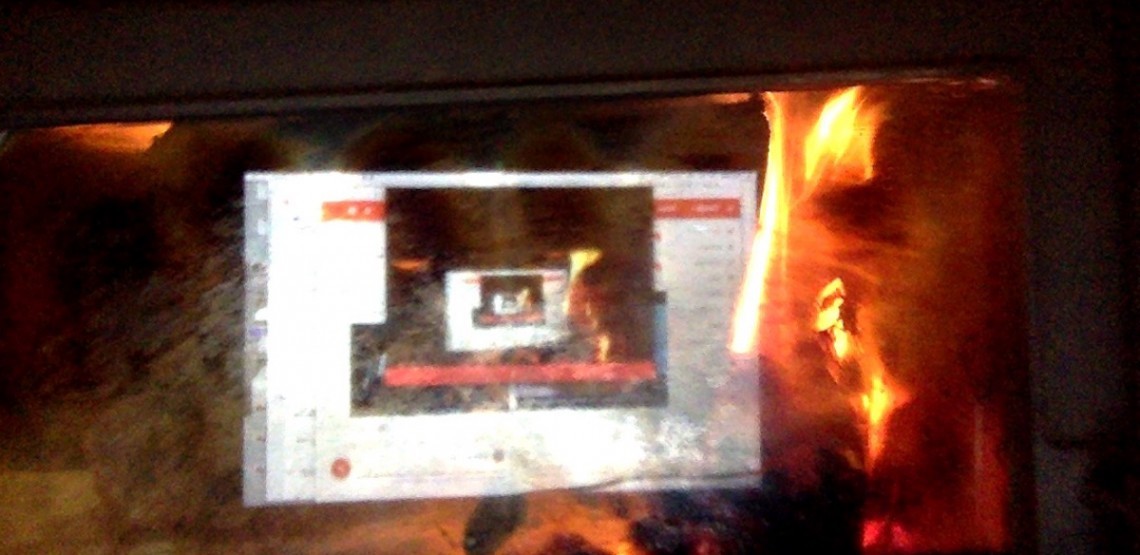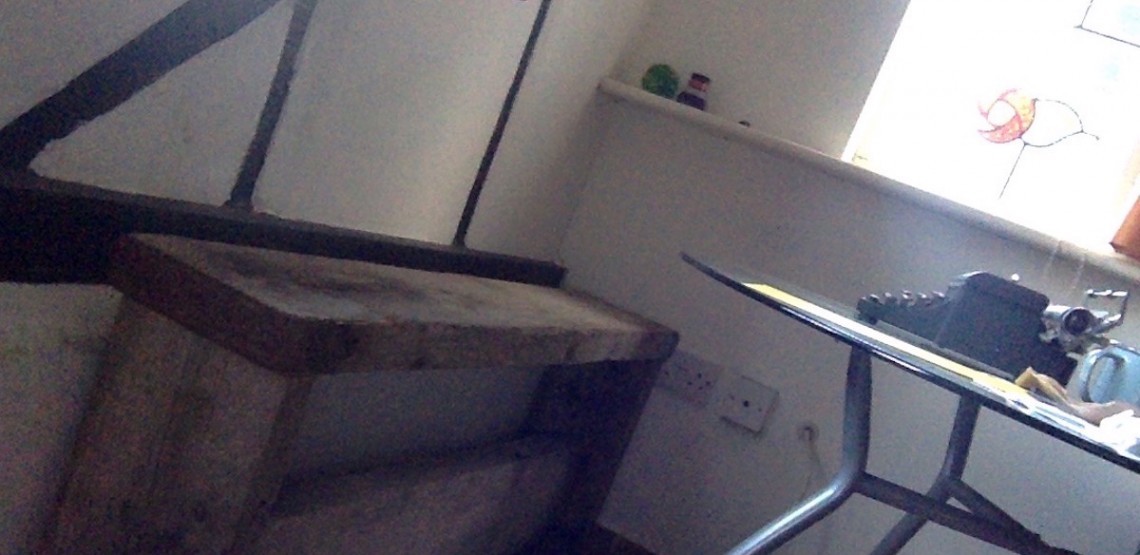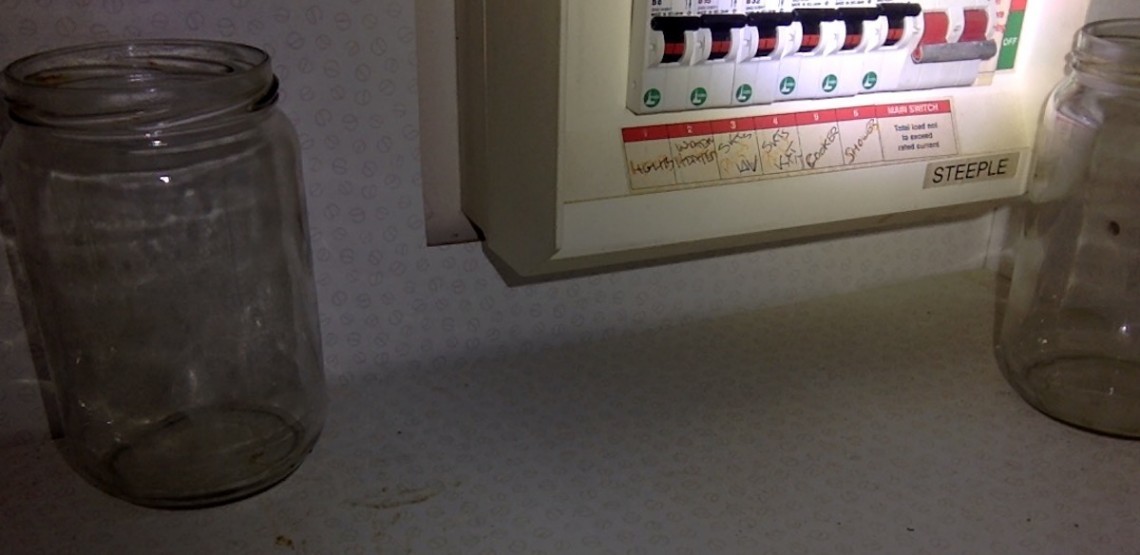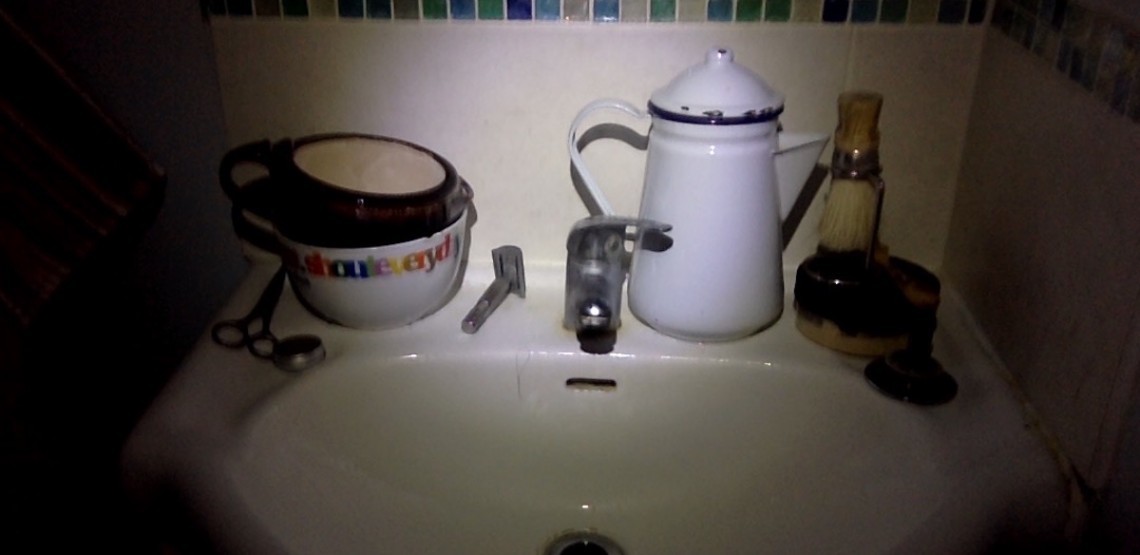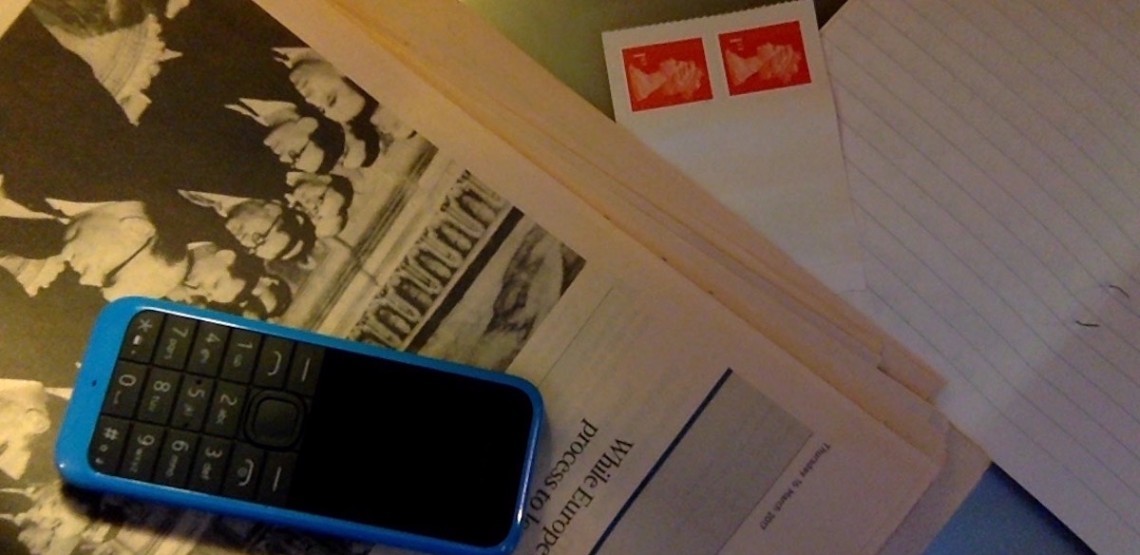A more radical version of the Challenge
“How do we interact with technology. Do we use it, or does it use us? What price do we pay for convenience, for seamless living?”
This is the first writing prompt from Punkt. in their Winter Digital Detox Challenge. They’ve invited people to go without a smartphone for 48 hours. I’ve never had a smartphone, so that would be too easy for me. In fact, I haven’t had a phone at all for about five years. So I decided to try a more radical version of the Challenge. At first I figured I’d reduce my laptop use to four hours a day. Then I thought, you know what? It’s the weekend. What if I just put the laptop away entirely for a couple days? That could be pretty liberating actually — and hey, if I can do this for one weekend, maybe I could do it every weekend…
This does suggest one good reason to get a low-tech phone like Punkt.’s MP01. Using a laptop for telecommunications means using it for everything. For example, I don’t have a stand-alone digital camera either, so I use the laptop to take pictures. I suppose in some sense I’m a bit of a minimalist…
But my relationship to technology is a bit complicated.
For a long time I’ve thought that because I’m a computer scientist, computer over-use is a professional hazard. But that’s really only true until it becomes a highly unprofessional hazard. (Edsger Dijkstra [a leading computer scientist from the 1950s to the 1980s] was famously fine with just handwriting and typewriters!)
After taking the picture above, I thought: you know what else? The electricity, which I pay for using a prepaid key, well I’m pretty sure the prepaid amount is going to run out pretty soon. What if I just don’t add value there for 48 hours? So, no phone, no laptop, no Wi-Fi, no electric lights, no electric cooker, no hot water heater. I guess that would be applying an extreme variety of monastic logic to the digital detox. But, hey, why not?
Saturday 22:56
“The importance of having beautiful things in our lives.”
“An omnidevice might give the appearance of minimalism, but is in fact thoroughly baroque in its essence and consequences.”
(Two more writing prompts, one of them custom-made for me.) Given that I had electricity, WIFI, and all the comforts of home, it’s not surprising that I took the usual daily dip into the mælström of mindless computer use that has, unfortunately, come to overtake many of my free hours – and that, truth be told, has dominated many hours when I should have been working. With the “spirit” of limiting my computer use in mind, I was perhaps a bit more mindful and moderate, and I even made it down to the garden. Nevertheless, this first weekend attempt counts as a fail. Still, I’ve gotten the little gears turning. While the pre-paid energy meter shows no signs of running out, there’s a master switch that I can use. That sounds like the makings of a good sabbath – next weekend.
For now, some more anticipatory musings.
Punkt. is not the only company to notice that there’s a problem with computer over-use, or to try and jump into this space in an interesting way.
ReMarkable has thrown their hat into the ring, with a new re-markable e-ink device (only available for pre-order at the time of writing), which they have accompanied with blog posts like “Are Digital Distractions The World's Latest Pandemic?”
“Pandemic” might be overstating the case, but even so I think we could at this point start to take so-called “First World problems” at least a little bit seriously. I’m thinking: Climate change. The rise and fall of democracies. Variations on the theme of Kitty Genovese.
My better nature seems to be inclined towards a functional aesthetic, minimalist in the sense that form-follows-function. But I have other, less-refined inclinations as well. These are the messy, deleterious, and possibly-toxic ones, that nevertheless possess their own aesthetic of “conscious anti-beauty” in the words of John Cale: so, everything from proto-punk to YouTube poop.
For me these right- and left-hand paths, as it were, have a concrete instantiation in my dual-booted computer. Mac OS is for everything fast, cheap, and out of control. Ubuntu is where I go to get “real” work done when I can. Could my problems with computer-overuse really be solved by getting rid of the Mac partition, or moving to a completely free/open software system? Honestly, I suspect I will need a more holistic approach.
The recent book Rest explains the idea of “deliberate rest,” a less-well-known sibling to deliberate practice. Deliberate rest seems highly relevant to me right now. At the same time (considering my dual-natured thinking), I am enchanted by the idea from another recent book that “Wasting Time on the Internet” isn’t actually wasting time.
“Unlike old media, the internet demands active engagement – and it’s actually making us more social, more creative, even more productive.”
It’s interesting to consider that the “omnidevice” might not be an easily grasped piece of machinery, like a laptop or smartphone – but rather the internet or social network itself. We just access it in different ways (Mac, Ubuntu, smartphone, dumbphone).
Today’s day and age with its frenetic pace (I refer here to the News of Trump) presumably requires more than just always-on engagement: it actually requires sustainable and strategic engagement. Some of the pieces of this puzzle seem to be falling into place.
I turned off my electricity this weekend and finally got some rest
00:52 Saturday – Main switch: “OFF”
10:00 Monday – Main switch: “ON”
Last weekend I wrote the foregoing paragraphs, mulling over how I would set up my digital detox. The following text was written after a weekend OFF.
What was it like? There were some quite obvious things: making a coffee took some planning, for example.
- light a fire
- get it really hot
- heat up water
This takes a lot longer than just boiling the kettle on the electric stove. I also figured out that I could save hot water overnight in my Stanley thermos and it would still be hot enough to use it for my morning shave.
Other things were more surprising: like how when the sun went down, at around 18:00, I got tired. That could just be because I have a built up sleep-debt going back fifteen or twenty years. Frankly, seeing this effect in action was a bit scary, and made me think I should be doing something similar every weekend for a while until I start to feel normal.
Gardening went well: I planted some “first early” potatoes and some alfalfa as a cover crop.
I sat down at the typewriter and touch-typed some notes in the dark. One of the themes I wrote about in these notes is how being “on” all the time might have some weird deep-psychology aspects to it. Like, being “available” is a role I got into as a kid. And even though I’ve tried to moderate that as an adult (like, by not having a phone, living in the country, working from home), it’s also morphed, in a manner you’d expect from Ballard or Lem, into a sort of advanced hypervigilance. This becomes even more aggravated under Trump:
“The condition upon which God hath given liberty to man is eternal vigilance.”
Nevertheless, that doesn’t say anything about being eternally glued to news-feeds.
Come Monday morning, after a weekend OFF: how do I feel? Great, actually! To some extent, still waking up. I made myself a nice hot coffee – as if on a whim – and am listening to some music for the first time in a few days.
And what did I miss? A look at today’s headlines:
- The award for best film was mistakenly presented to La La Land instead of actual winner Moonlight.
- John McDonnell disowns article he wrote week ago claiming ‘soft coup’ against Corbyn
- Trump White House scrambles to check scandal over FBI inquiry into Russia ties…
To be honest, nothing too out of the ordinary; and certainly nothing worth giving up a weekend of my life to absorb.
Epilogue: Making the #punktchallenge sustainable
This epilogue contains some retrospective reflections on my “weekend OFF”. As noted above, I found the experience both refreshing and somewhat scary. It also stimulated some interesting discussions.
One friend of mine was worried about me isolating myself: I think not just in the context of this weekend, but as a broader theme. My dad sympathised and told me about how he had finally been enjoying some time off for skiing and art museums. “Digital detox” formed the basis of interesting conversations with a new acquaintance at the University of Oxford who is studying “digital distraction.”
All in all I wouldn’t have tried the experiment if I, myself, was not worried, harried, and distracted. My personal worries have come to a head in insomnia: presumably that’s what happens when someone tries to make a change after a decade of poor “sleep hygiene.” I’m thinking now about my long-term health. The weekend OFF was eye-opening in this regard. But, I am taking some other steps as well.
I have in mind an advertisement for heroin that I saw scrawled in bathroom graffiti at my local cafe some years ago: “HEROIN: Don’t get depressed, get some deep rest.”
The question is how to do this “sustainably” – insofar as I’m not interested in starting up a drug regimen, and, at the same time, I can’t guarantee that I have the will-power to take every weekend off to garden and snooze.
Here’s one step in the right direction: I started a 13 week trial subscription to the Financial Times. This seems to be a good alternative to reading online news, which, on reflection, shades into celebrity gossip and clickbait very, very, quickly.
As a result (or so it seems to me) I’ve posted way less on social media than I used to. The paper is full of both interesting and boring stuff. The “Companies and Markets” section is pretty likely to put me to sleep, but at the same time could be worth reading, on the assumption that someday I might have enough money to invest. I even spent a while daydreaming about making a mid-career transition into finance. I think here of David Foster Wallace’s novel The Pale King, which I’ve also added to my current reading list.
In my current reality as a postdoctoral researcher working from home, my most recent employer has required me to get a phone. Due to the rush involved, I decided on a cheap Nokia rather than the MP01 I had been scoping out. The MP01 is more in line with the urbane but earthy style that I aspire to than the Nokia 105. I’ve saved up and splashed out for indigo-dyed jeans, hand-made boots, merino wool shirts, and a nice tweed jacket, so why not a phone to match? It’s kind of funny how, after years without a phone at all, I suddenly found myself in a hurry to buy one. Carphone Warehouse was nearby: for now the MP01 remains an object of desire.
As my essay winds down I’d like to put forward a longish quote from Wasting Time on the Internet, which I’ve added to my toolkit along with the Financial Times and The Pale King. The following quote, from page 17 of WTotI, is about a woman named Ingrid Williams who is reflecting on a digital detox: Kenneth Goldsmith’s response to her narrative is rather dismissive.
“‘Those spellbinding heavens are always hiding in plain sight above us, if only we would unplug long enough to notice.’ Even in such lighthearted Sunday morning fare, her words are laced with an all-to-pervasive, unquestioning guilt about technology. Try as she might, the writer is enmeshed with technology to the point that she is unable to experience nature without technological mediation. She may have left her devices at home, but she’s still seeing the world entirely through them. Her brain, indeed, has become differently wired and all the nature in the world on a weekend digital detox won’t change that. What was accomplished by this trip? Not much. Far away from her devices, all she did was think obsessively about them. Returning from her trip, it’s hard to imagine that much changed. I can’t imagine that in the spirit of her adventure she wrote her piece out longhand in number 2 pencils on legal pads by candlelight, only to sit down at a Remington typewriter bashing out the final draft, and filing it via carrier pigeon. No. Instead, the morning her piece appeared, she retweeted a link to the article: ‘.@ingridkwilliams goes off the grid on a charming Swedish island.’”
The sense of superior and enlightened cynicism expressed in the passage above is hardly the final word in, or about his book, which I’ve found to be an engaging read. My own view is that, having rewired our neurology around “hard” technology once, we ought to be able to upgrade once again with some “soft” technologies that change the way we relate to the “harder stuff.”
The realisation that a smartphone is a computer is a smartphone brings to mind a weird blend of Gilliam’s Brazil and Jobs’s Apple—possibly transported to Ingrid Wilson’s Swedish island. Surely there will be room for many innovations in this space! For example, I recently ‘bashed out’ a 4000 word essay on my Royal, which I later reworked on a Google Doc using “Voice Typing.” The result, in my admittedly biased opinion, reads well.
I think it is important not only to “have beautiful things in our lives,” but to live sensibly and sensefully. These are the fundamental concepts underlying “aesthetics.” According to a previous Punkt. challengee, Luke Davies,
“So where do I go from here? Smartphone-free weekends is what I’ll be going forward with, I want that freedom back.”
Something like that really does sound about right. Whether it’s the screen-free “Amazing Hour” proposed by James Hamblin in his vlog hosted by The Atlantic, or weekends off—way off – I think we can play around with how we relate to technology in creative ways without having it right there in front of us.
On page 37 of Wasting Time on the Internet, Goldsmith says:
“We came to the conclusion that when we waste time on the Internet, we usually do it alone or as a parallel activity – like in a dorm or a library […] By inserting the network and machine into the midst of physically based social interaction, new forms of communal activity were possible.”
This is something that the #punktchallenge has also done: it has made our relationship with technology social again.
Joe Corneli
@JoeCorneli
medium.com/@holtzermann17
